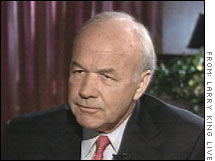|
U.S., Lay estate ink $12M pension settlement Enron workers who lost their pensions can seek up to $12 million from Enron founder's estate; payout could be less. New York (CNNMoney.com) -- The federal government said Thursday that it agreed to cap at $12 million the amount of money that Enron workers who lost their pensions could try to recover from the estate of Ken Lay, the former Enron chairman who died in July. But claimants may not receive the full $12 million in reparations for their losses, the Labor Department said in a statement.
Lay, who died of a heart attack after his conviction in May on charges on conspiracy and fraud related to Enron's collapse, testified during his trial that he was $250,000 in the red because most of his net worth was tied up in worthless Enron stock. He added that legal bills ate up the rest of his fortune and that he still owed millions to his attorneys. The Labor Department said any final recovery will depend upon the total amount of assets available for distribution from Lay's estate. The proposed settlement is subject to approval from the U.S. District Court for the Southern District of Texas. The department sued Lay in June 2003 for misrepresenting the company's financial turmoil to employees and encouraging them to continue to buy Enron stock even though he knew the company was in trouble. He was also sued for failing to monitor those in charge of Enron's pension plans and, as a member of the board of the directors, for neglecting to appoint a trustee who would oversee the company's employee stock ownership plan. The settlement, if approved, would add to the pot of money that's been recovered for the participants of Enron's doomed pension plan. The government and private plaintiffs have already recovered about $221 million from Enron, its board of directors, officers and fiduciaries that served on the pension plan's administrative committee. But the recovery of the $221 million is being appealed. And the Labor Department has yet to settle with Enron's former chief executive Jeffrey Skilling, who was convicted of 19 counts of conspiracy and fraud in May. Skilling's sentencing is scheduled for Oct. 23. Lay's unexpected death left the government and civil litigants in a quandary over how to proceed with a mountain of civil lawsuits that had been facing the disgraced executive. Because Lay died before he had the chance to appeal, not only does his conviction get thrown out under a legal doctrine called abatement, but it is now as if he had never been indicted in the first place. And without a conviction, the government and a wide net of civil claimants are going to have a hard time recouping any financial restitution from Lay's estate. Federal prosecutors did file a motion Wednesday asking U.S. Judge Sim Lake - who presided over the Enron trial - to delay clearing Lay's conviction from the record until Congress can consider a U.S. Justice Department proposal to take such power away from the courts. The proposed law would apply to any case still active on July 1, allowing U.S. prosecutors to force Lay's estate, overseen by his wife Linda, to forfeit $43.5 million the government has said Lay gained illegally. Separately, the government has already filed a motion attempting to hold Lay's co-defendant Skilling responsible for Lay's $43.5 million forfeiture. That would obligate Skilling to pay $183 million in restitution to government for his and Lay's convictions. ----------------------------------------------------------- |
|

